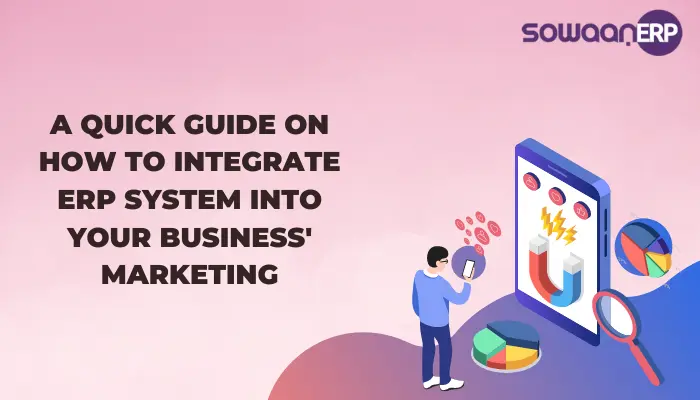
Business operations are multifaceted, complex, and challenging to run. That’s why it’s no surprise that enterprise resource planning (ERP) software is steadily growing in demand. With it, companies can integrate all of their data, operations, and functions into a single streamlined system. That can simplify things like financials and sales data, human resources management, inventory, project information, and other vital operations that sustain a business and keep it running efficiently. More importantly, ERP software provides access to real-time business data that leaders can use to make more informed decisions that boost operations and workplace productivity.
All this means ERP solutions can also be beneficial for another critical aspect of business operations: marketing. The software can improve data management for more efficient marketing campaigns that can drive up sales and enhance customer engagement. Wondering how to reap these benefits? Here’s a quick guide on how your business can integrate ERP into your marketing strategy for amplified success.
Have an integration plan in place
Before the integration process begins, it is important to establish a plan with your team to better understand how ERP will be used for marketing. Start by thinking about why you want to use ERP for your business’ marketing, the kind of data you wish to collect, and the possible edge cases to be considered—atypical or extreme situations that may require special handling in software programming. This can help set up a clear list of goals like enhancing client engagement, improving brand awareness, and increasing traffic when using ERP for marketing.
To ensure a better fit between ERP software and your next marketing campaign, work closely with someone familiar with the strategies your business wants to use. Collaborating with marketing managers can help greatly with this, as they have the knowledge to develop, implement, and execute marketing strategies that yield profitable results for a business. Their expertise and understanding of marketing activities—and experience in conducting successful campaigns—can better guide your ERP integration plan and more effectively ensure it’s geared toward your company’s overarching marketing objectives.
Decide on an ERP system
One of the best things about ERP software is that it’s highly customizable, so it can be altered to fit the nature of your business. When you have your integration plan, the next thing your company can do is decide on the kind of ERP system you can maximize for marketing. Try looking for one that is easy to use, has low system costs, and can easily visualize marketing data. Our own SowaanERP solution offers these features, but it goes further by providing a bug-fix warranty to run systems without defects and upgraded support to ensure you’re always using the updated version of the software.
If your business has specific marketing needs, consider enlisting a reliable ERP consultant familiar with ERP software and who can determine which system will best suit your current marketing goals. Aside from helping choose a specific ERP software, they can also look at the company’s existing systems to find places where an ERP can be integrated to further improve operations.
Verify system credentials and set up interactions
Once your business decides on an ERP system to use, you can start the integration process by verifying system credentials and merging your application programming interface (API) code into it and any other software you usually use in marketing. This can include any platforms for accounting, bookkeeping, project management, or customer service that you currently use to boost your marketing campaigns. The API is what will enable your programs to interact with one another for a more streamlined process, especially when it comes to data transfers, information processes, and other operations related to marketing.
Furthermore, the verification of the system credentials will allow you to determine how these interactions will determine the way data is processed and transferred. For example, if you want to improve marketing, you can set up interactions to focus on marketing tools such as analytics, databases, and data points. ERP can make it easier to collate this information, which your business can use to develop data-driven marketing strategies for campaign effectiveness.
Activate automation
Automation presents several benefits for businesses, but it primarily enhances operational efficiency and improves productivity by independently completing repetitive and time-consuming tasks. Automation in the workplace can also be configured to run data and be customized to suit your company’s needs, such as syncing with your chosen ERP system. This allows for a more streamlined data transfer between different business tools, meaning marketing teams can more immediately access information that can boost their next campaign.
Without automation, employees would otherwise have to monitor and input data manually, which can be taxing and lead to delays in delivering marketing output. By using it, your chosen ERP software can automatically collect and process data related to aspects like campaign data, customer engagement, competitor statistics, and other operational information. This frees up the time for marketing teams to focus on more vital tasks such as producing promotional materials and overseeing customer outreach campaigns to increase exposure for your business.
ERP software can make it easier for businesses to bolster the productivity and success of their marketing campaigns. Since it’s highly customizable, be sure to thoroughly consider how to integrate it into your current marketing operations to see the best results.
